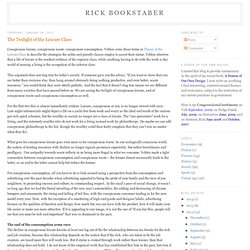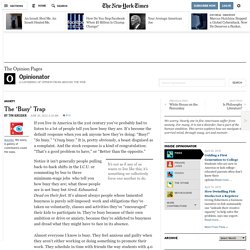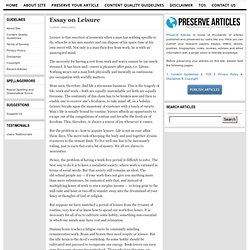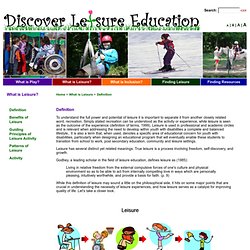

We Have Entered The Twilight Of The Leisure Class. Conspicuous leisure, conspicuous waste, conspicuous consumption.

Veblen coins these terms in Theory of the Leisure Class to describe the strategies the noble and priestly classes employ to assert their status. Veblen observes that a life of leisure is the readiest evidence of the superior class, while anything having to do with the work-a-day world of earning a living is the occupation of the inferior class. This argument does not ring true for today's society. If someone gave you the advice, “If you want to show that you are better than everyone else, then hang around obviously doing nothing productive, and even better, waste resources.” you would think they were utterly pathetic. And the fact that it doesn't ring true means we are different from many societies that have passed before us. For the first two this is almost immediately evident. What goes for conspicuous leisure goes even more so for conspicuous waste. As Mumford points out, industrialization changes what society values.
The 'Busy' Trap. Anxiety: We worry.

A gallery of contributors count the ways. If you live in America in the 21st century you’ve probably had to listen to a lot of people tell you how busy they are. It’s become the default response when you ask anyone how they’re doing: “Busy!” “So busy.” “Crazy busy.” It’s not as if any of us wants to live like this; it’s something we collectively force one another to do. Notice it isn’t generally people pulling back-to-back shifts in the I.C.U. or commuting by bus to three minimum-wage jobs who tell you how busy they are; what those people are is not busy but tired. Brecht Vandenbroucke Even children are busy now, scheduled down to the half-hour with classes and extracurricular activities. The present hysteria is not a necessary or inevitable condition of life; it’s something we’ve chosen, if only by our acquiescence to it. Our frantic days are really just a hedge against emptiness. I am not busy. Here I am largely unmolested by obligations.
Essay on Leisure. Leisure is that sweetest of moments when a man has nothing specific to do, when he is his own master and can dispose of his spare time at his own sweet will.

Not only is a man then free from work, he is with an unoccupied mind. The necessity for having a rest from work and worry cannot be too much stressed. It has been said—sweet is pleasure after pain, i.e. labour. Nothing wears out a man both physically and mentally as continuous pre-occupation with worldly matters. Most men, therefore, find life a strenuous business. But the problem is—how to acquire leisure. Hence, the problem of having a work-free period is difficult to solve. But suppose we have snatched a period of leisure from the tyranny of routine, very few of us know how to spend our work-free hours. Human brain reaches a fatigue curve by constantly minding remunerative work. Leisure perhaps is the very essence of life. Leisure Education.
To understand the full power and potential of leisure it is important to separate it from another closely related word, recreation.

Simply stated recreation can be understood as the activity or experience, while leisure is seen as the outcome of the experience (definition of terms, 1999). Leisure is used in professional and academic circles and is relevant when addressing the need to develop within youth with disabilities a complete and balanced lifestyle,. It is also a term that, when used, denotes a specific area of educational concern for youth with disabilities, particularly when designing an educational program that will eventually enable these students to transition from school to work, post secondary education, community and leisure settings. Leisure has several distinct yet related meanings. True leisure is a process involving freedom, self-discovery, and growth. Godbey, a leading scholar in the field of leisure education, defines leisure as (1985): Freedom Self-discovery Growth.